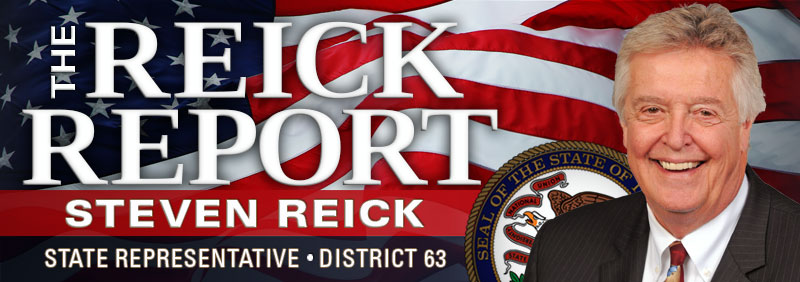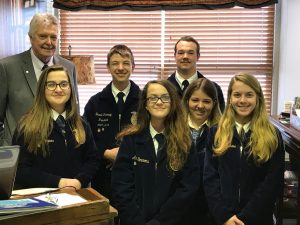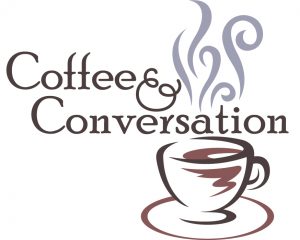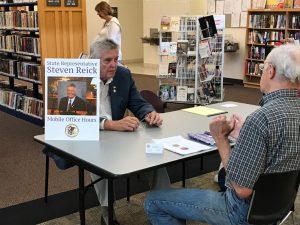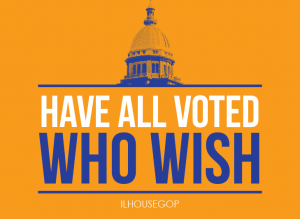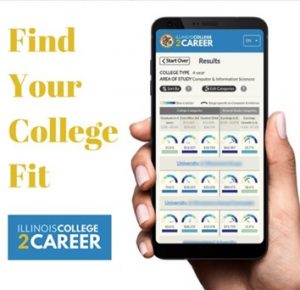Reick Named “Friend of Agriculture”
LIHEAP to Accept Applications for Heat Assistance on October 1
- Proof of gross income from all household members for the 30-day income period beginning with the date of the application.
- A copy of their current heat and electric bills issued within the last 30 days (if they pay for their energy directly).
- A copy of their rental agreement (if they are renting) showing that utilities are included, the monthly rental amount and landlord contact information.
- Proof of Social Security numbers for all household members.
- Proof that their household received Temporary Assistance for Needy Families (TANF); Aid to the Aged, Blind, or Disabled (AABD); or other benefits, such as Medical Eligibility or Supplemental Nutrition Assistance Program (SNAP), if receiving assistance from the Illinois Department of Human Services.
Click here for additional information.
Rep. Reick Files Legislation to Establish Private Sector Examination of State Agencies to Identify Opportunities for Cost Savings in Government
HB 5957 creates the Commission on Fiscal Responsibility and Reform Act, creating a private sector panel to undertake a thorough review of Illinois agencies and provide recommendations for improvement. The panel would consist of 18 voting members, and none could have a stake in any state agency. Like the Grace Commission, this Commission would be privately funded by soliciting contributions to be made to a 501(c)(4) social welfare organization as called for in the bill. Commission members would not be paid.
The independent commission would conduct an in-depth review of State agencies with a focus on finding improvements that would increase efficiency, reduce costs, enhance accountability and improve administrative control. The group would also provide opportunities for managerial improvements over the short and long term and suggest specific areas where further study could result in additional savings. Results would be presented to the Governor and the General Assembly by October 1, 2019.
The failure over decades to examine measures to control costs has led to ever-increasing demands for more tax revenue, and we’ve reached the point where productive, taxpaying Illinoisans are saying ‘I’ve had enough,’ and they’re leaving the state to find better opportunities elsewhere.
Reick to Launch Coffee & Conversation Tour
Governor Declares Harvest Emergency in Illinois
Fall Mobile Office Hours Tour Underway
- Thursday, October 11: Marengo-Union Library, 19714 E. Grant Highway, Marengo
- Thursday, November 8: Harvard-Diggins Library, 900 E. McKinley Street, Harvard
- Monday, November 19: McHenry Library, 809 Front Street, McHenry
All events will take place from 10:00 AM until noon. I always look forward to talking one-on-one with people as I bring my office to them in their own community. I can help explain the services my office can provide while learning about my constituents’ personal priorities. No appointment is needed for any of the mobile office hours events. Future mobile office hours dates and locations will be posted on my web site at www.repstevenreick.com.
Illinois Unemployment Rate Matches Lowest on Record
The Illinois Department of Employment Security (IDES) announced last week that the unemployment rate fell to 4.1 percent in August and nonfarm payrolls decreased by -5,200 jobs over-the-month, based on preliminary data provided by the U.S. Bureau of Labor Statistics (BLS) and released by IDES. The July job gain was revised down slightly from its initial report to show no growth. (+0 jobs versus +3,700 jobs).
Job growth moderated in the June to August period posting average monthly gains of +4,000 jobs over this three-month period, less than the prior 3-month average monthly gain of +8,300 jobs between May and July 2018.
Over-the-year, nonfarm payroll employment increased by +47,500 jobs with the largest gains in these industry sectors in August: Manufacturing (+11,300); Government (+10,500); and Financial Activities (+8,200). The industry sectors with over-the-year declines were: Information Services (-3,200) and Other Services (-600). Illinois nonfarm payrolls were up +0.8 percent over-the-year in sharp contrast to the nation’s +1.6 percent over-the-year gain in August.
The state’s unemployment rate is +0.2 percentage points higher than the national unemployment rate reported for August 2018, which held at 3.9 percent. The Illinois unemployment rate is down -0.9 percentage points from a year ago when it was 5.0 percent. The Illinois jobless rate last stood at 4.1 percent in February 1999. The difference between the Illinois unemployment rate and the U.S. rate represents the smallest gap since December 2010.
Reick Sits for Radio Interview
The Governor’s office on Management and Budget (GOMB) has signed off on the release of State funds to assist McHenry County College with heating, ventilation and air conditioning (HVAC) improvements for the community college’s “A Building.” The college is renovating areas within its A Building and the improvements include replacing aging roof-top units (RTUs) and duct work to improve air circulation and temperature in the building. The RTUs are over 27 years old and are operating beyond their life cycle. They require more and more maintenance to keep operational, have lost some functionality and are inefficient for today’s energy standards. In addition, the duct work is over 40 years old and has failed in several locations. The total project cost is estimated at $800,000 and the college has agreed to pay $646,870 while the State pays the remaining $153, 130. The McHenry County College HVAC project allocation is part of $11.3 million in project funds that were released for use by community colleges throughout Illinois. Additional funds for other community college capital projects are expected to be announced in the coming weeks.
Illinois Awarded $29 Million to Fight Opioid Crisis
The Illinois Department of Human Services (IDHS) is receiving nearly $29 million in new federal funding to help the state fight the opioid crisis.
The federal grant was awarded by the Substance Abuse and Mental Health Services Administration (SAMHSA), a branch of the U.S. Department of Health and Human Services (HHS). It brings to $61 million the total that the federal government has awarded to the state to fund important programs and initiatives meant to improve and expand access to treatment and recovery services for opioid use.
These funds will support the expansion of treatment and recovery interventions across the state, including medication-assisted treatment services for individuals with opioid use disorders who are incarcerated in county jails and hospital resources to link patients experiencing opioid overdoses with treatment programs in their communities. Housing for people in recovery from opioid use disorder and support services for patients at federally qualified health care centers also will receive grant funding. The award will strengthen and enhance the Illinois Prescription Monitoring Program, the state’s tracking system that helps to prevent the misuse of prescription opioids.
This grant also will expand opioid overdose protocols training for first responders and widen availability of the overdose reversal medication naloxone, commonly referred to as Narcan. In state fiscal year 2018 alone, IDHS supported the purchase of more than 18,000 naloxone kits for first responders and bystanders. This award will help IDHS purchase additional naloxone kits.
Additionally, the Centers for Disease Control and Prevention recently awarded the Illinois Department of Public Health almost $3.7 million as part of a Cooperative Agreement for Emergency Response: Public Health Crisis Response grant to combat the opioid epidemic.
The funding will enhance the state’s capacity to rapidly respond to the opioid overdose crisis through improved data collection and prevention efforts. The grant will allow Illinois to increase its capacity to identify and report timely, comprehensive syndromic surveillance data on fatal and nonfatal opioid overdoses.
If you or someone you know is experiencing opioid use disorder, call the state’s Helpline for Opioids and other Substances at 1-833-2FINDHELP or visit HelplineIL.org.
Illinois Launches College and Career Planning Tool
The idea is to help students and parents make college decisions based on an evaluation of real-time successes of a school’s graduates, in addition to other factors such as cost, average debt levels, and likelihood to graduate on-time. The tool will also show the benefits of investing in higher education, as it demonstrates how connected our thriving higher education system is to the workforce development of our state.
ILCollege2Career.com is the product of collaboration between the Governor’s Office, Illinois Board of Higher Education (IBHE), the Illinois Community College Board (ICCB), the Illinois Student Assistance Commission (ISAC), and the Illinois Department of Employment Security (IDES).
The launch of the web site follows a number of recent education achievements in the state including:
- $25 million allocated for higher education in Fiscal Year 2019 and merit-based scholarship program AIM HIGH to encourage Illinois’ best and brightest high school grads to stay in Illinois for college
- A law that requires the ISAC to develop a three-year pilot program to better educate students on loan amounts, repayment and interest;
- A new law that creates a task force to study how student college or career interest data can be collected and shared between high schools and colleges so higher education institutions will be able to enhance their programs and services to support the specific needs of their incoming student body;
- Revisions to the Monetary Award Program (MAP) to prioritize access for existing grant recipients, and;
- Strengthened degree-advising services that make it easier for students to transfer credits between Illinois schools.
Take Advantage of the Treasurer’s Money Match Program
In Illinois, the State Treasurer is tasked with safeguarding unclaimed property, such as unpaid life insurance benefits, forgotten bank accounts and unused rebate cards. Illinois holds more than $2 billion in unclaimed property. The State Treasurer is legally required to get the property to the rightful owners no matter how long it takes for them to come forward.
The Treasurer’s Office wants to make sure you know about a new program, Money Match, that was recently launched to return unclaimed property to Illinois residents more quickly and efficiently. This program was made possible by legislation passed by the Illinois General Assembly last year. The Treasurer’s Office is now authorized to work with the Illinois Department of Revenue to match the names of unclaimed property owners with recent tax return records.
Using this proactive matching process, the Treasurer’s Office will automatically return lost money to qualifying Illinois taxpayers without the need to file a claim or gather paperwork. The property must be $2,000 or less in cash with only one owner. If a recent mailing address is identified and confirmed, the person will receive a letter announcing the amount and source of the money and notifying the recipient to look for a check in the mail.
Money Match’s goal is to return more money, more quickly to Illinois taxpayers. Residents will start to receive notification letters as soon as this month. The program expects to return $12 million statewide in the coming weeks. This new matching program comes on the heels of a record-breaking year for ICash of 116,000 successful claims returning more than $180 million in unclaimed property to individuals, businesses and non-profits in Illinois.
Individuals can still search the state treasurer’s database for their name or the name of their business or non-profit at www.illinoistreasurer.gov/ICASH.
